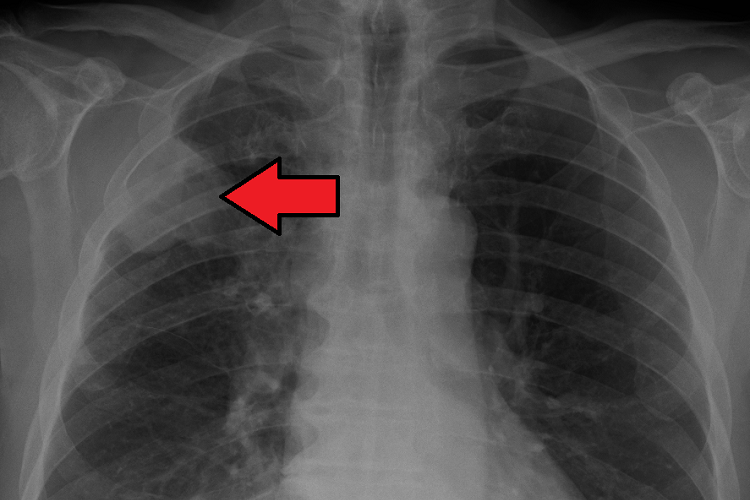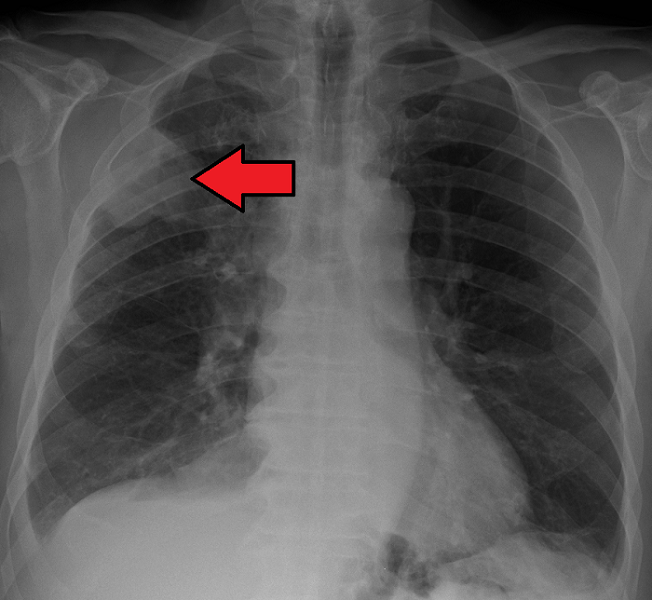

X-ray of lung cancer. (Photo courtesy of James Heilman, MD.)
By Michael Balash
The “cancer beast” fears scientists. Firefighters and others depend on scientists for innovations in prevention and treatment. Firefighters are often exposed to cancer toxins, leading many to a diagnosis of cancer. In fact, a National Institute of Occupational Safety and Health (NIOSH) report from 2016 supports this and cites a 14-percent increased risk of dying from cancer compared to the general population. Researchers collated data on 30,000 firefighters who participated in the study.1
Fire service leaders have responded to this alarm by stepping up their efforts in education and prevention. They have improved standard operating procedures and have become more diligent data collectors. Still, there continues to be too many active and retired firefighters fighting cancer.
I am a retired firefighter who was diagnosed with stage 4 lung cancer. Cancer is a family disease; it affects your entire family. I use today’s standard-of-care therapy and, together, we have hope for new treatments. There are problems in the cancer research and care system. Researchers, oncologists, and geneticists have told us the following:
- New treatments face too many regulations and take too long.
- Sharing data is poor, which slows down the system.
- Cancer research, clinical trials, and biobanks are extremely important but have too many restrictions and not enough participants.
Is there hope? YES, because there has been a change of late; a spark to share research, the use of the latest technology, fostering new partnerships, and making it easier for patient involvement. There is new excitement with hope in many areas such as genomic analysis, which has led to some successful treatments including (1) targeted therapies, combination therapies, and immunotherapies, and (2) molecular tumor boards that include medical oncologists, surgeons, radiologists, researchers, geneticists, and pathologists meeting to review patient history and current treatment. They are collectively discussing and making recommendations, leading to better patient treatment plans. Genomic testing is changing our standard of care.
One organization behind this spark is the Biden Cancer Initiative (BCI).2 The BCI, co-founded by Dr. Jill Biden and former Vice President Joe Biden, has a message for everyone:
“Every day, every minute matters to patients and we must bring the sense of urgency to our cancer research and care systems.”
The Initiative works to accelerate cancer research by provoking discussion and collaboration. They have contacts within the biotech, technology, science, and academic fields who promote data sharing and technology. To achieve their sense of urgency, they also promote patient and nonpatient participation in research. Many organizations from the public, private, and nonprofit sectors have joined in, committing to a wave of action. Following are just two examples.
The “All of Us” research program at the National Institute of Health (NIH) is a historic effort to gather samples, such as blood and urine, from one million people living in the United States to help accelerate research.3 The Institute needs participants, and it is committed to finding new treatments. It has entered into partnerships to develop the following:
- A biobank with the Mayo Clinic in Rochester, Minnesota, to store samples.
- Genome centers with the Baylor College of Medicine, the Broad Institute, and the University of Washington’s Northwest Genomics Center to analyze the samples.
- Data and research centers with Vanderbilt University Medical Center and Verily Life Sciences in San Francisco, California, to acquire and organize the data into diverse datasets for researcher access.
Another example of fostering new partnerships to speed new therapies to patients is the annual Industry/Academia Translational Oncology Symposium at Moores Cancer Center in San Diego, California.4 Organized by the University of California—San Diego’s Department of Industry Relations and supported, in part, by innovative companies like Pfizer and Genomic Health, the symposium brings together industry leaders and researchers to discuss ways to accelerate new laboratory discoveries into treatments for patients. Leaders from a number of fire service organizations have also joined in the wave by making commitments toward collaboration and participation. Some examples of their partnering include the following:
- The International Association of Fire Fighters (IAFF) has endorsed genomic testing, which may lead to new treatment options for its members. General President Harold Schaitberger said, “This advanced technology is already providing unprecedented insights in the drivers of each patient’s cancer,” and “These insights are supporting personalized cancer treatment strategies today, and could one day help lead to a cure.”5
- The Miami Department of Fire and Rescue, along with other departments, are working with Miami’s Sylvester Comprehensive Cancer Center’s Firefighter Cancer Initiative (FCI). The FCI, through a series of projects that includes a biobank, is addressing the excess burden of cancer among firefighters. The FCI is a research initiative led by a multidisciplinary team of scientists who aims to study firefighters’ exposure to carcinogens; their risks for developing cancer; and methods of education for prevention, screening, and early detection.6
- FirefighterAid7 is a firefighter nonprofit support organization in San Diego, California, that has partnered with Human Longevity, Inc. (HLI).8 HLI is a genomic-based health intelligence company on a mission to improve health. It has given 100 firefighters gene sequencing, a whole body MRI, and a cardiac scan.
- President Donald Trump signed the Firefighter Cancer Registry Act of 2018 (H.R. 931) into law. Multiple fire departments will be selected to assist the Centers for Disease control (CDC) in the collection of detailed data on the occurrence of cancer in firefighters. It will need participants. This registry will help scientists better understand the link between cancer and firefighters.
Many organizations such as the Sylvester Comprehensive Cancer Center, the CDC, and NIOSH are eager to help the firefighters who often put their lives on the line. They have scientists and staff ready to work, and they want to make a difference and need firefighters and others to participant as they access existing data and work to gather new data.
This sharing and participation is a win-win situation; the research will not only help firefighters, it may also slay the cancer beast. We as community firefighters should spread the word.
References
- https://www.cdc.gov/niosh/firefighters/health.html.
- bidencancer.org.
- https://allofus.nih.gov.
- moores.ucsd.edu/industryrelations/symposium.html.
- client.prod.iaff.org/#contentid=54502.
- https://umiamihealth.org › Sylvester Comprehensive Cancer Center › Research.
- firefighteraid.org.
- https://www.humanlongevity.com.
Michael Balash is an assistant chief (ret.) with the Sacramento (CA) Fire Department. He is also a founder of cancerbeast.com. Balash is a current cancer patient.

